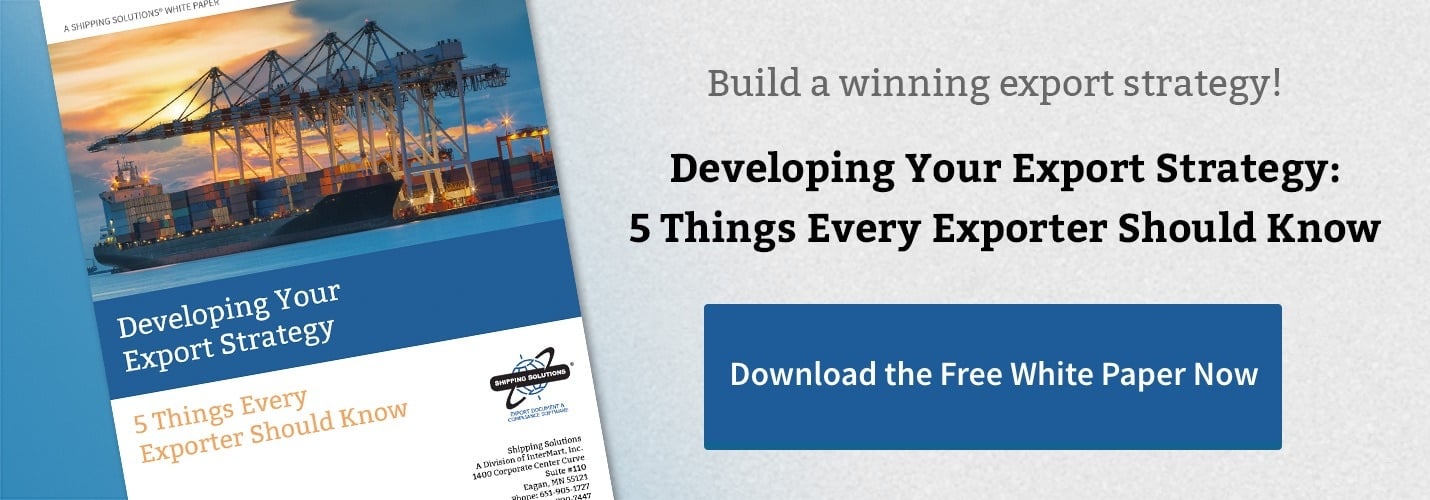The International Trade Blog International Sales & Marketing
14 Reasons Small Businesses Should Start Exporting
On: December 3, 2018 | By:  Joseph A. Robinson |
4 min. read
Joseph A. Robinson |
4 min. read
 Right now is the perfect time for your small company to explore the benefits and merits of exporting. Or, if you export a little bit already, right now is the time to look at expanding your exports to additional countries.
Right now is the perfect time for your small company to explore the benefits and merits of exporting. Or, if you export a little bit already, right now is the time to look at expanding your exports to additional countries.
The U.S. Department of Commerce emphasizes that 97% of all U.S. exporters are small businesses. It also reports that 96% of the world's customers reside outside the United States.
But these two numbers do not reflect the whole story. Government statistics indicate that only about one percent of all U.S. companies are involved in exporting.
Many smaller businesses are so busy running their day-to-day operations that they don't consider their export potential. Oftentimes, companies think exporting is too burdensome, or they are not aware of export and financing services offered by the U.S. government. But there are many more reasons why a small business should start.
14 Reasons to Start Exporting
1. Increase your overall sales and profits.
2. Increase the scope of your business making you more competitive domestically.
3. Take advantage of relatively lower costs of transportation.
4. Take advantage of the ongoing reduction in trade barriers thanks to recent trade agreements.
5. Reduce your total reliance on a single domestic market.
6. Extend and broaden your customer base.
7. Add sustainable life into your line of current products.
8. Flatten out seasonal product use and market fluctuations to achieve a more even production schedule and sales performance.
9. Take advantage of current favorable exchange rates that make U.S. goods and services even more of a bargain to foreign buyers.
10. Reduce available excess inventory or excess production capacity and staffing due to the struggling domestic economy.
11. Take advantage of improvements in trade finance, the internet, and trade agreements that have dramatically increased access to worldwide markets.
12. Exporting can be lucrative for businesses of all sizes. On average, sales grow faster, more jobs are created, and employees earn more than in non-exporting firms.
13. You may have a comparative advantage because the United States is known throughout the world for innovative goods and services, high-quality customer service, and sound business practices.
14. You may have less risk mitigation than at any time in the past because most companies that export have an easier time riding out fluctuations in the U.S. economy and are more likely to stay in business. A recent study published by the Institute for International Economics concludes that U.S. companies that export not only grow faster, but are nearly 8.5% less likely to go out of business than non-exporting companies.
If exporting is beneficial to the growth and profit of a company, then why don't more small companies actually export? The pretext for not exporting most often involves three explanations.
First, companies say they do not know how to get started. Second, companies claim that they do not have the staff with adequate export knowledge about how to go about entering the export arena and how to follow through once orders are received. Third, companies say they would export if they had a level playing field.
Helping Small Companies Start Exporting
If you are still leery about exporting, there is good news. The Small Business Administration (SBA) provides counseling, training and financing support to small businesses to allow them to take advantage of export opportunities. The SBA is dedicated to helping small businesses succeed in the overseas marketplace by providing one-on-one as well as intra-agency trade education and by making export loan guaranty programs available to small companies.
The number of small-and medium-sized exporters more than doubled between 1992 and 2007, and nearly three-quarters of exporters have fewer than 20 employees. There have been many instances that a small company can leverage exports with the help of the SBA and not add extra staff until ROI justifies hiring additional staff to continue growing their export business.
As many U.S. firms seek new opportunities, they find conducting international business offers unique challenges. That's where the U.S. Commercial Service comes in. Every year, the U.S. Commercial Service, often in partnership with the SBA, helps thousands of U.S. companies navigate those challenges to export goods and services worth billions of dollars.
Located in 109 cities across the United States and U.S. Embassies and Consulates in more than 75 countries, the U.S. Commercial Service's global network of trade professionals can help open doors around the world.
Whether you're looking to make your first export sale or expand to additional international markets, the U.S. Commercial Service offers the trade counseling, market intelligence, business matchmaking, and commercial diplomacy you need to connect with lucrative business opportunities.
Check out the list of current U.S. Commercial Service partners at the Strategic Partnership Program's website.
In fiscal 2010, the U.S. Commercial Service network generated nearly 12,300 export successes, facilitating 34.8 billion dollars in U.S. export sales.
This post was originally published in April 2012 and has been updated to include current information, links and formatting.

About the Author: Joseph A. Robinson
Joe Robinson has 43 years hands-on experience in global commerce targeting new markets highlighting investment opportunities. He is an author, has lived abroad 4 times; traveled to 81 countries and exported to 105 countries in both private corporations and in government positions. He is currently a consultant to companies, government agencies and universities providing guidance in export procedures, regulatory control and compliance.
He graduated from Virginia Tech with a BS in Economics and Master of International Management from the Thunderbird School of Global Management. He was 1 of 5 Americans to receive a full Japanese government scholarship to study International Market Research at Keio University in Tokyo, the leading Business School in Asia.
Joe was the International Trade Manager for the State of Virginia providing assistance for export management, marketing and best business practices covering export control support and compliance training and procedures manuals and led many overseas businesses and delegation trade missions to Asia, Europe, the Middle East and Latin America




